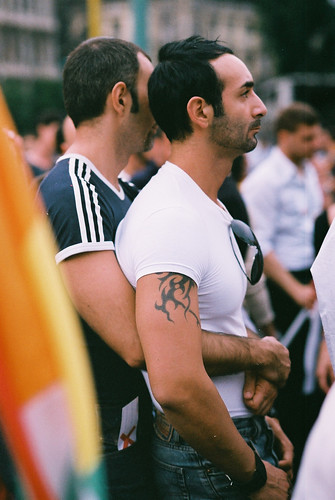We run our website the way we wished the whole internet worked: we provide high quality original content with no ads. We are funded solely by your direct support. Please consider supporting this project.
Guest Post: Culture War Neighbors by Bonnie Kristian
The first time I was aware of meeting a gay person, I was 18. I took a summer job waiting tables, and it turned out two of my coworkers were attracted to people of the same sex. One, a waiter in his 40s, fit every stereotype on Will and Grace. The other was a girl maybe five years older than me. She had model good looks, a sweet personality, and a girlfriend.
When I realized my coworkers were gay, my immediate reaction was worry. They’d find out I was a Christian sooner than later. Was I supposed to tell them the church I attended prohibited same-sex relationships? That seemed really awkward. But if I didn’t tell them, was I ashamed of my faith?
Every shift we were scheduled together, I was concerned about how I could both honor God and have good work relationships. But as one lunch rush led to another, I realized my coworkers weren’t particularly interested in my opinions.
They were interested in whether I’d help them when they were swamped.
They were interested in picking up a shift for me if I needed time off.
They were interested in being decent to their coworkers and giving their tables a nice experience at our restaurant and making good tips—just like me.
Scurrying to refill drinks, polishing silverware and sweeping floors, begging the cooks to hurry up on that new batch of bread, we were neighbors.
If I’d worked at that restaurant longer than a few months and had a chance to get to know those two better, the day may well have come to share my convictions. But for the time I was there, it was enough that they knew I was a Christian, and that a Christian could be their neighbor.
But “neighbor” isn’t a favored term of the culture wars, is it? Caught up in inflammatory rhetoric—in accusations of hate speech and sin, of immorality and inflexibility—it’s all too easy to see our cultural foils as anything but our neighbors. Yet whatever we decide about politics and the Bible’s teaching on these topics, “love thy neighbor” must be our main culture war tactic. Because even if they’re wrong on every issue, people on the other side of the culture wars are people Jesus died to save.
And we have not been patient, we have not been kind.
We have envied, we have boasted, we have been proud in our own righteousness.
We have dishonored others, we have been self-seeking, we have been easily angered, we have kept many records of wrongs.
We have taken pleasure in the failings of our opponents and made the truth serve our purposes.
We have placed political victory above forbearance, trust, hope, and loyalty.
Lord, have mercy.
No matter what we believe the Bible says about these controversial issues, the simplest way to imitate Jesus’ approach is to do what he did: Intentionally get to know the people our society has deemed problematic or sinful. Learn their stories. Find out firsthand what helps them, what gets them interested in church and what sends them running out the door. Do less talking, more listening, and even more just being normal people together.
Personally, I was never interested in more than a knee-jerk, negative reaction to same-sex relationships before I met anyone who was gay. The Bible seemed pretty straightforward, and the whole thing wasn’t my problem—so why bother? But that’s the thing about loving your neighbor as yourself: If we really take the “as yourself” part seriously, their problems become our problems.
If we’re willing to eat, to work, to pray with our culture war neighbors instead of against them, half the war’s already won.
Bonnie Kristian is a writer and editor who lives with her husband in the Twin Cities. She is a graduate student at Bethel Seminary, and more of her work may be found at www.bonniekristian.com. This essay is adapted from her forthcoming book, Love God. Love People. Love Liberty.
Category: General
Tags: Bonnie Kristian, Culture, Homosexuality, Jesus, Kingdom Living, Love, Mercy
Related Reading

Memorial Day
For Memorial Day, we thought we would repost Greg’s thoughts from 2007. In this post, Greg expresses his conflicted feelings over this holiday and gives a brief defense of Christian pacifism. *** Hope you all had a happy Memorial Day. (Isn’t that something of a misnomer — a happy time remembering people killed in war?) Memorial Day…

Video Q&A: Do you think Jehovah’s Witnesses and Mormons are saved?
Does Greg believe that everyone goes to Heaven regardless of their beliefs? Find out here.

The Phinehas vs. Jesus Conundrum
I’ll be frank. This is not a blog that will be easy for some people to read. But it’s a blog I believe every follower of Jesus should read – even if you have to force yourself to press on. It’s about something we all wish was not true. It’s about the way the Bible…

God and Our Political Platforms
Rachel Held Evans posted a blog today on the stir created when Democrats booed the passing of “an amendment to the party platform reinstating language that identified Jerusalem as the rightful capital of Israel and that referred to people’s “God-given potential” in its preamble.” Of course this fed into the belief that if you’re a…

Sanctuary
. SantiMB . via Compfight Jamie Wright wrote this penetrating essay of encountering a woman in a moment of extremity and need. It’s a reminder of our great need for a sanctuary, a safe place to come when the world has gone mad and we have nowhere else to go. From her essay: Because,…

The Greatest Love Story Ever Told
This is the first week of Advent, the season where we anticipate the coming of Christ. It’s a time to hear and enter into the story of how Jesus came out of love to give his life for us. This grand love story of Christmas taps into a deep intuition we have about the centrality…

